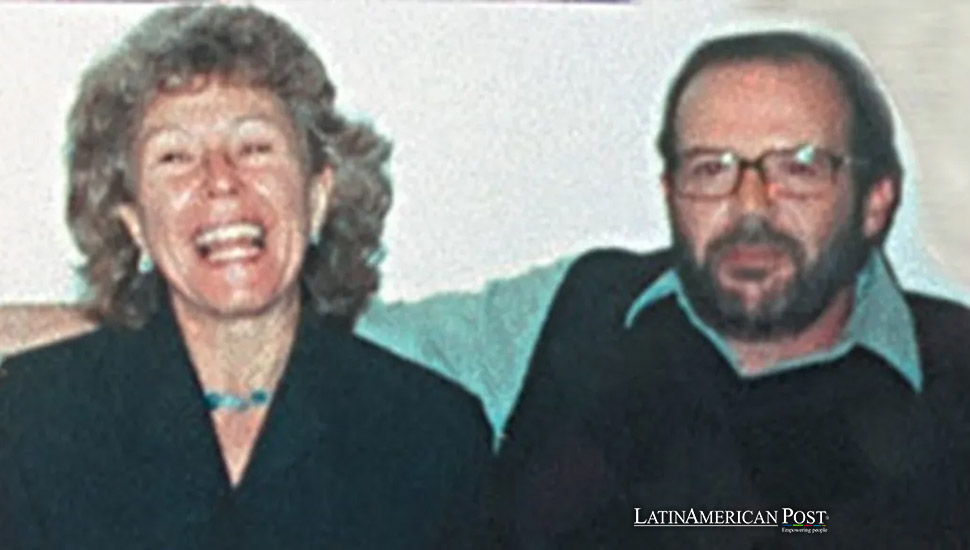Two Decades Later Brazil Still Haunted by the Tragic Von Richthofen Murders

Nearly 22 years after the brutal murder of Manfred and Marisia von Richthofen at the hands of their daughter, Brazil continues to grapple with the horror of this shocking crime. The case remains one of the most infamous in the country’s history, a chilling reminder of the depths of human betrayal.
On the morning of November 1, 2002, São Paulo, Brazil’s bustling economic heart, was gripped by the news of a horrific crime. Manfred and Marisia von Richthofen, an affluent couple living in the upscale neighborhood of Brooklin, had been found brutally murdered in their home. The details of the crime were grotesque, but what made it genuinely shocking was that the mastermind behind the murder was none other than their daughter, 18-year-old Suzane von Richthofen.
The murders stunned Brazil, not only because of their brutal nature but also because they occurred within a family that epitomized privilege and success. Manfred, a highly respected engineer, and Marisia, a well-regarded psychiatrist, had worked hard to give their children every advantage. Their daughter, Suzane, was expected to inherit a fortune and live a life of comfort. Yet, despite having everything, Suzane chose a path of betrayal, conspiring with her boyfriend, Daniel Cravinhos, and his brother, Christian, to murder her parents in cold blood.
The crime sent shockwaves through the nation, dominating headlines and sparking intense media coverage. Twenty-two years later, the Von Richthofen case remains a haunting reminder of the deadly consequences of greed, entitlement, and familial betrayal.
The Von Richthofen Family: A Picture of Privilege
To understand the impact of the von Richthofen murders on Brazilian society, it’s essential to grasp the family’s background. Manfred and Marisia von Richthofen were successful professionals who had built a life of wealth and privilege for their children. Manfred was the director of DERSA, a state-owned company responsible for managing São Paulo’s highways, while Marisia worked as a psychiatrist in the local community.
The family’s luxurious home in the affluent Brooklin neighborhood was a testament to their success. They provided their children, Suzane and her younger brother Andreas, the best education money could buy. Suzane attended elite private schools, spoke multiple languages, and was enrolled at the prestigious Pontifical Catholic University of São Paulo, where she studied law. The family’s wealth was estimated at around $17 million, and Suzane stood to inherit a considerable fortune, including $10 million held in a Swiss bank account under her name.
Despite their wealth and status, the von Richthofen was known as a tight-knit, loving family. Yet, beneath this facade of privilege, tensions simmered between Suzane and her parents, particularly after she began dating Daniel Cravinhos, a young man from a less privileged background.
A Deadly Plan Takes Shape
Suzane met Daniel in 1999, and the two quickly became inseparable. However, the relationship was a source of growing concern for her parents. Daniel, a mechanic from a modest background, lacked the ambition and drive that Manfred and Marisia had instilled in their children. While Suzane was on track to inherit millions, Daniel had dropped out of school and was content to spend his days smoking marijuana and engaging in idle pursuits.
As the relationship deepened, tensions between Suzane and her parents escalated. Manfred and Marisia disapproved of Daniel, fearing he was a bad influence on their daughter. In the summer of 2002, Suzane invited Daniel to move into the family home while her parents were away on a trip to Europe. The couple spent the month indulging in drugs and alcohol, further straining her relationship with her parents upon their return.
The final straw came when Suzane asked her father to buy her and Daniel an apartment. Manfred refused, telling her that if she wanted to live with Daniel, she would have to do so without the family’s financial support. This rejection, coupled with her growing resentment toward her parents, led Suzane to plot their murder.
On the night of October 31, 2002, Suzane, Daniel, and Christian put their deadly plan into action. After sneaking Andreas out of the house to attend a LAN party, Suzane turned off the family’s security system and let Daniel and Christian inside. The brothers, armed with iron bars, made their way to Manfred and Marisia’s bedroom and attacked the couple as they slept. The scene was brutal: Manfred and Marisia were beaten nearly beyond recognition, and when Marisia showed signs of life after the initial assault, the attackers resorted to strangling her with a towel and suffocating her with a plastic bag.
After the murders, the trio staged the scene to look like a robbery, scattering papers and stealing money before fleeing the house.
The Investigation and Trial
The morning after the murders, Suzane and Andreas returned home, claiming to have discovered the bodies of their parents. While Andreas was devastated by the loss, collapsing in grief, Suzane’s calm demeanor immediately raised suspicions. As the police began their investigation, Suzane’s story inconsistencies emerged. There were no signs of forced entry, and the supposed robbery appeared staged. The alarm system had been disarmed, suggesting that the killer was someone with intimate knowledge of the house.
The breakthrough in the case came when police received an anonymous tip about a suspicious purchase made by Christian Cravinhos shortly after the murders. Christian had used cash to buy a motorcycle, raising questions about how he had come into such a large sum of money. When questioned by police, Christian quickly confessed to the crime and implicated his brother and Suzane in the plot.
The confessions shocked the nation. Media outlets reported every detail of the investigation, and the public was horrified by Suzane’s role in the murders. Despite her attempts to shift the blame onto Daniel, it became clear that Suzane had been the mastermind behind the crime, driven by greed and a desire to live freely with her boyfriend.
In July 2006, Suzane, Daniel, and Christian were convicted of first-degree murder. Suzane and Daniel were each sentenced to 40 years in prison, while Christian received a 38-year sentence. The trial marked the culmination of a case that had captivated Brazil and exposed the dark side of privilege and entitlement.
The Legacy of the Von Richthofen Murders
More than two decades after the von Richthofen murders, the case continues to haunt Brazil. The betrayal at the heart of the crime—the murder of two loving parents by their daughter—left an indelible mark on the national psyche. The media coverage of the case, which included shocking details of the murders and the cold demeanor of Suzane, further fueled public outrage.
For many, the von Richthofen case symbolizes the dangers of unchecked entitlement and the corrosive effects of greed. Suzane’s actions, motivated by a desire to inherit her parents’ wealth and live a life of luxury, have been held up as a cautionary tale about the perils of privilege.
The case also had a lasting impact on the von Richthofen family. Andreas, who had already been devastated by the loss of his parents, struggled to cope with the betrayal by his sister. In the years following the murders, Andreas’ mental health deteriorated, culminating in a public breakdown in 2017 when he was found wandering the streets in a disoriented state. The tragedy of the von Richthofen family is not just the loss of Manfred and Marisia, but also the emotional toll it took on their surviving son.
The Continuing Influence of the Case
The von Richthofen murders remain one of Brazil’s most infamous criminal cases, with their impact still felt more than 20 years later. The case has been the subject of books, documentaries, and films and continues to be a topic of discussion in both legal and cultural contexts. The brutality of the crime, combined with the shocking betrayal at its heart, ensures that the von Richthofen murders will not be forgotten.
In 2023, Suzane was released on probation after serving 16 years in prison. She now lives with her boyfriend and their son, which has sparked renewed public debate about the justice system and the possibility of Suzane eventually inheriting her family’s fortune. While she has paid for her crime with years behind bars, many Brazilians feel that Suzane’s release and potential inheritance are a miscarriage of justice, given the gravity of her actions.
The von Richthofen murders serve as a grim reminder of the fragility of family relationships and the devastating consequences of greed. As Brazil continues to remember the tragedy that unfolded in 2002, the case stands as a testament to the complex dynamics of privilege, entitlement, and betrayal.
Also read: Cuddly Criminals: Brazil’s Dark Underbelly of Stuffed Animal Heists
In the decades since the murders, Brazil has experienced its share of tragedies and scandals, but few have resonated with the same intensity as the von Richthofen case. The story of Suzane, her parents, and the deadly plot she orchestrated remains etched in the collective memory of the nation, a haunting reminder of the darkest corners of the human soul.





